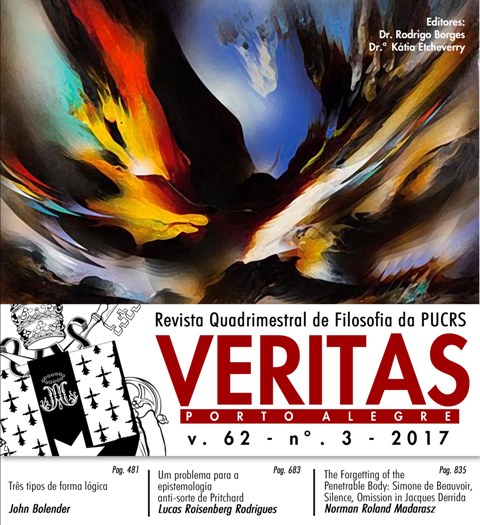An experimental realism based solution for two pessimistic inductions
DOI:
https://doi.org/10.15448/1984-6746.2017.3.28684Keywords:
Pessimistic induction, Problem of unconceived alternatives, Experimental Realism, Causal realism.Abstract
In this paper, I will try to give an account of two historically informed anti-realist challenges named by Stanford (2006) as ‘old’ and ‘new pessimistic induction’, respectively. I argue that there is already an answer to both pessimistic challenges: the experimental realism originally proposed by Hacking (1983) and Cartwright (1983). According to that realism, it is possible to be committed to theoretical entities with which we develop causal interactions and produce controlled phenomena, even without extending that commitment to theories themselves. Instead of taking properly Hacking’s and Cartwright’s widely criticized arguments, I will assume a sophisticated experimental realism formulation put forward by Egg (2012).Downloads
References
CARTWRIGHT, N. How the Laws of Physics Lie. Oxford: Clarendon, 1983. DOI: https://doi.org/10.1093/0198247044.001.0001
CARVALHO, Fábio Tenório de. Inferir Explicações e Explicar Inferências:Uma abordagem pragmático-transcendental da Inferência à Melhor Explicação. Tese de Doutorado, UFMG, 2013.
CHAKRAVARTTY, Anjan. A Metaphysics for Scientific Realism: Knowing the Unobservable. Cambridge University Press, 2007. DOI: https://doi.org/10.1017/CBO9780511487354
______. What you don't know can't hurt you: Realism and the unconceived. Philosophical Studies 137 (1):149 - 158 (2008). DOI: https://doi.org/10.1007/s11098-007-9173-1
EGG, Matthias. Causal Warrant for Realism about Particle Physics. Journal for General Philosophy of Science / Zeitschrift für Allgemeine Wissenschaftstheorie 43 (2):259-280 (2012). DOI: https://doi.org/10.1007/s10838-012-9202-4
______. Expanding Our Grasp: Causal Knowledge and the Problem of Unconceived Alternatives. British Journal for the Philosophy of Science (2014) 67 (1):axu025. pp.1-27.
HACKING, Ian. Representing and Intervening: Introductory Topics in the Philosophy of Natural Science. Cambridge University Press, 1983. DOI: https://doi.org/10.1017/CBO9780511814563
HITCHCOCK, Christopher Read. Causal explanation and scientific realism. Erkenntnis (1992) 37 (2):151 - 178. DOI: https://doi.org/10.1007/BF00209320
KITCHER, Philip. The Advancement of Science: Science Without Legend, Objectivity Without Illusions. Oxford University Press, 1993.
KUHN, Thomas S. The Structure of Scientific Revolutions Vol.. The University of Chicago Press, 1962.
LAUDAN, Larry. A confutation of convergent realism. Philosophy of Science 48 (1):19-49 (1981). DOI: https://doi.org/10.1086/288975
LIPTON, Peter. Is the Best Good Enough? Proceedings of the Aristotelian Society 93:89-104 (1993). DOI: https://doi.org/10.1093/aristotelian/93.1.89
______. Truth, existence, and the best explanation. In A. A. Derksen (ed.), The Scientific Realism of Rom Harré. Tilburg University Press, 1994.
LYONS, Timothy D. Scientific Realism and the Pessimistic Meta-modus Tollens. In CLARKE, Steve; LYONS, Timothy D (eds.). Recent Themes in the Philosophy of Science: Scientific Realism and Commonsense. Dordrecht: Kluwer, 2002, pp 63–90. DOI: https://doi.org/10.1007/978-94-017-2862-1_4
PIERSON, Robert & REINER, Richard. Explanatory warrant for scientific realism. Synthese 161 (2):271 – 282 (2008). DOI: https://doi.org/10.1007/s11229-007-9159-8
PSILLOS, Stathis. Scientific realism and the 'pessimistic induction'. Philosophy of Science 63 (3):314 (1996). DOI: https://doi.org/10.1086/289965
______. Scientific Realism: How Science Tracks Truth. Routledge, 1999.
PUTNAM, H. Mathematics, Matter and Method. Cambridge University Press, 1975.
SANKEY, Howard. Scientific Realism. Theoria 48 (98):35-54 (2001). DOI: https://doi.org/10.3167/004058101782485548
SKLAR, L. Do unborn hypotheses have rights? Pacific Philosophical Quarterly 62, 17–29 (1981). DOI: https://doi.org/10.1111/j.1468-0114.1981.tb00039.x
STANFORD, P. Kyle. Exceeding Our Grasp: Science, History, and the Problem of Unconceived Alternatives. Oxford University Press, 2006. DOI: https://doi.org/10.1093/0195174089.001.0001
SUÁREZ, Mauricio. Experimental realism reconsidered: How inference to the most likely cause might be sound. In CARTWRIGHT, N; HARTMANN, S; HOEFER, C & BOVENS, L. (eds.). Nancy Cartwright's Philosophy of Science. Routledge, 2008, pp. 137-163
VAN FRAASSEN, Bas C. A imagem científica. Trad. Luiz Henrique de Araújo Dutra. Editora Unesp; Discurso Editorial, 2007.
VICKERS, Peter. A Confrontation of Convergent Realism. Philosophy of Science 80 (2):189-211 (2013). DOI: https://doi.org/10.1086/670297
WOODWARD, James. Making Things Happen: A Theory of Causal Explanation. Oxford University Press, 2003. DOI: https://doi.org/10.1093/0195155270.001.0001
Downloads
Published
How to Cite
Issue
Section
License
Copyright
The submission of originals to Revista Veritas implies the transfer by the authors of the right for publication. Authors retain copyright and grant the journal right of first publication. If the authors wish to include the same data into another publication, they must cite Revista Veritas as the site of original publication.
Creative Commons License
Except where otherwise specified, material published in this journal is licensed under a Creative Commons Attribution 4.0 International license, which allows unrestricted use, distribution and reproduction in any medium, provided the original publication is correctly cited. Copyright: © 2006-2020 EDIPUCRS</p






